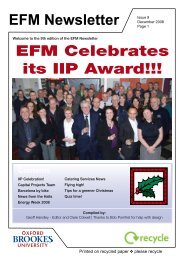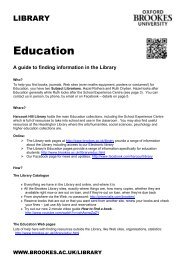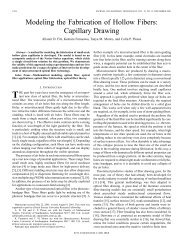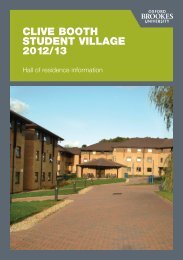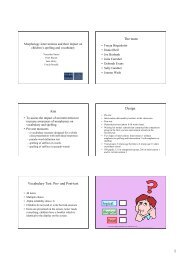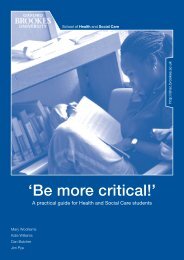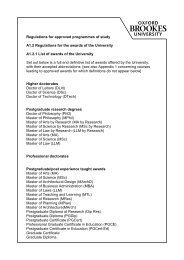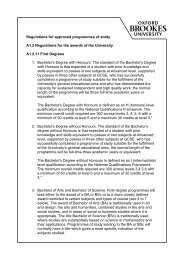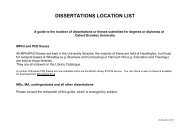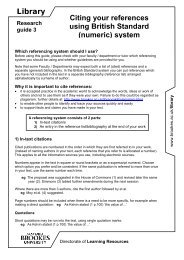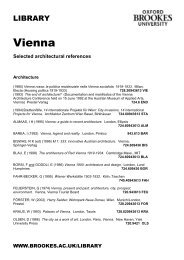Section 1 Definitions of Ability Key issues - Oxford Brookes University
Section 1 Definitions of Ability Key issues - Oxford Brookes University
Section 1 Definitions of Ability Key issues - Oxford Brookes University
You also want an ePaper? Increase the reach of your titles
YUMPU automatically turns print PDFs into web optimized ePapers that Google loves.
Gifted & Talented Co-ordinators’ Secondary Pr<strong>of</strong>essional Development Programme 2005-06<br />
Course Materials | Unit 1 <strong>Section</strong> 1<br />
Examples <strong>of</strong><br />
definitions<br />
talented pupils is to identify those pupils who should receive<br />
targeted provision. This process can be seriously hampered if<br />
staff are using a range <strong>of</strong> personal definitions <strong>of</strong> ability which<br />
conflict with one another.<br />
Although schools can not be expected to resolve longstanding<br />
dilemmas about definition, they can arrive at a working definition<br />
that, on the one hand, is informed by the debate in the field and,<br />
on the other, reflects the school ethos. Establishing a working<br />
definition is not an end in itself, but rather the first step in creating<br />
a broad, workable consensus that leads to effective provision for<br />
gifted and talented pupils. Indeed, the process <strong>of</strong> discussion is<br />
arguably as important as the final definition, if the aim is to raise<br />
staff awareness and bring about pr<strong>of</strong>essional development and<br />
confidence in providing for these pupils.<br />
A school-wide definition is also an essential management and<br />
monitoring tool that enables resources to be equitably assigned<br />
and progress efficiently tracked. The co-ordinator’s role is to<br />
facilitate the debate, to act as the school’s ‘resident expert’ and<br />
to enable the school to reach its own answer to the question<br />
‘Who are the gifted and talented in our school?’<br />
Studies have shown that many schools experience a ‘gifted and<br />
talented journey’ in which the definition and identification <strong>of</strong> high<br />
ability becomes increasingly sophisticated and broad-based.<br />
(Ofsted 2001: Nord Anglia Research Project 2001: HMI<br />
2003).This is also borne out by research from <strong>Oxford</strong> <strong>Brookes</strong><br />
<strong>University</strong> (Haight 2005).<br />
Below are eight definitions taken from the literature. You may<br />
wish to reflect on them and then carry out the boxed task at the<br />
end <strong>of</strong> this section.<br />
‘Giftedness is asynchronous development in which<br />
advanced cognitive abilities and heightened intensity<br />
combine to create inner experiences and awareness that are<br />
qualitatively different from the norm. This asynchrony<br />
increases with higher intellectual capacity. The uniqueness<br />
<strong>of</strong> the gifted renders them particularly vulnerable and<br />
requires modifications in parenting, teaching and counselling<br />
in order for them to develop optimally.’ (The Columbus<br />
Group, 1991)<br />
‘A gifted pupil is one who demonstrates a significantly higher<br />
level <strong>of</strong> ability than most pupils <strong>of</strong> the same age in one or<br />
more curriculum areas or in any <strong>of</strong> the following:<br />
• physical talent<br />
• artistic talent<br />
• mechanical ingenuity<br />
• leadership<br />
• high intelligence<br />
• creativity<br />
(Eric Ogilvie, 1973)’<br />
(Marston Middle School policy, quoted in Eyre, 1997: 145)<br />
Page 2 <strong>of</strong> 6 November 2005 © Westminster Institute <strong>of</strong> Education, <strong>Oxford</strong> <strong>Brookes</strong> <strong>University</strong>



